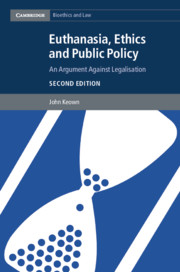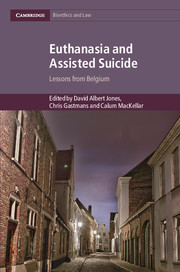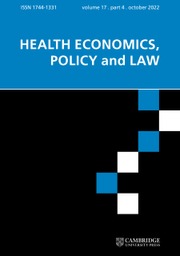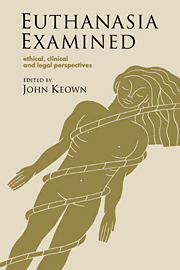Euthanasia, Ethics and Public Policy
This book argues against the legalisation of voluntary euthanasia and/or physician-assisted suicide on the ground that, even if they were ethically defensible in certain 'hard cases', neither could be effectively controlled by law. It maintains that the experience of legalisation in the Netherlands, Belgium and Oregon lends support to the two 'slippery slope' arguments against legalisation, the 'empirical' and the 'logical'. The empirical argument challenges the feasibility of drafting and enforcing adequate safeguards against abuse and mistake; the logical argument shows that acceptance of the case for euthanasia in the case of suffering patients who request it logically involves acceptance of euthanasia for suffering patients who are unable to request it, such as infants and those with advanced dementia.
- Whereas most books on the subject argue in favour of legalisation, this book argues against legalisation
- Focuses on the two 'slippery slope' arguments against legalisation, the 'practical' and the 'logical' arguments
- Documents the failure of the law in three key jurisdictions - the Netherlands, Belgium and Oregon - to ensure effective control
- Provides an up-to-date account of international developments, and how they have done nothing to weaken the argument against legalisation
Reviews & endorsements
'… magisterial.' Igor Judge, former Lord Chief Justice of England and Wales
'A masterly analysis of the results of legalisation. Future discussions can, and must, be evidence-based.' Onora O’Neill, Emeritus Professor of Philosophy, and former Principal of Newnham College, University of Cambridge
'Though it hardly seems possible, this updating of the classic text on the quintessential issue in modern medicine has made its analysis of the ethical and legal issues in euthanasia even more trenchant and illuminating.' Alexander M. Capron, University of Southern California, and former Director of Ethics, Trade, Human Rights, and Health Law at the World Health Organization
'John Keown is undoubtedly one of the all-time leading writers on assisted suicide and euthanasia. He writes with great power and clarity.' Yale Kamisar, Clarence Darrow Distinguished University Professor of Law Emeritus, University of Michigan
'Euthanasia, Ethics and Public Policy is a meticulous, highly readable, and profoundly disturbing examination of the merits of the slippery slope arguments. … John Keown's book is essential reading for everyone interested in the AD [Assisted Dying] debate (which should be all of us) - regardless of personal conviction.' Charles Foster, New Law Journal
'This is the latest addition to John Keown’s library of excellent books to do with euthanasia … and … the best. This book is the best collection of information regarding euthanasia that I have seen and it is strongly recommended if you have any interest in the euthanasia and assisted-dying debate.' Roger Woodruff, International Association for Hospice and Palliative Care Newsletter
'The author offers a deep analysis of complicated ethical issues, and yet his writing remains comprehensible and engaging, making for an accessible and stimulating read. In sum, this volume presents a welcome reference contribution to one of the most important ethical debates of our age. Despite having a well-defined position, Keown succeeds in advocating for his perspective while presenting a complete overview of the main ethical, legal, and empirical arguments used against legalising euthanasia.' Carlos Gómez‑Vírseda, Theoretical Medicine and Bioethics
‘The second edition … is an indispensable work that should inform the debate about legalization in the years to come … The work is marked by a sophisticated analysis of the legal issues and by an acute understanding of the actual practice of assisted suicide and euthanasia.’ Richard S. Myers, Ave Maria Law Review
Praise for the first edition: '… the best book in print on the case against the legalisation of euthanasia.' The Tablet
Praise for the first edition: '… a most significant contribution to the debate …' Medical Law Review
Praise for the first edition: 'Keown's clarity of thought explodes myths and beats an accessible path through a detailed jungle of morality and social history.' British Medical Journal
‘This second edition is a long-awaited masterpiece, following 16 years after the publication of the first edition. The discussion on end-of-life care in various countries written in this new edition will be great reference to onward discussions in Japan … This new edition, too, describes the judicial precedents, commentaries, and legislative process of each country in a careful manner. I would highly recommend reading Professor Keown’s new edition to anyone including non-legal personnel.’ Miki Hirano, Journal of Medical Law
Product details
November 2018Paperback
9781107618336
558 pages
228 × 152 × 25 mm
0.89kg
1 b/w illus. 2 tables
Available
Table of Contents
- Part I. Definitions:
- 1. Euthanasia and physician-assisted suicide
- 2. Intended v. foreseen life-shortening
- Part II. The Ethical Debate: Human Life, Autonomy, Legal Hypocrisy, and the 'Slippery Slope'
- 3. The value of human life
- 4. The value of autonomy
- 5. Legal hypocrisy?
- 6. The slippery slope arguments
- Part III. The Dutch Experience:
- 7. The guidelines
- 8. The first survey: the incidence of 'euthanasia'
- 9. Breach of the guidelines
- 10. The slide towards NVAE
- 11. The second survey
- 12. The Dutch in denial?
- 13. The Euthanasia Act and the Code of Practice
- 14. Effective control since 2002?
- 15. Continuing concerns
- 16. A right to physician-assisted suicide by stopping eating and drinking?
- 17. Assisted suicide for the elderly with 'completed lives'
- Part IV. Belgium:
- 18. The Belgian Legislation
- 19. The lack of effective control
- Part V. Australia:
- 20. The Northern Territory: ROTTI
- Part VI. The United States:
- 21. The United States: Oregon and six other jurisdictions
- 22. The US Supreme Court: Glucksberg and Vacco
- Part VII. Canada:
- 23. The Supreme Court of Canada: the Carter case
- 24. Canada's euthanasia legislation
- 25. Conclusion.










